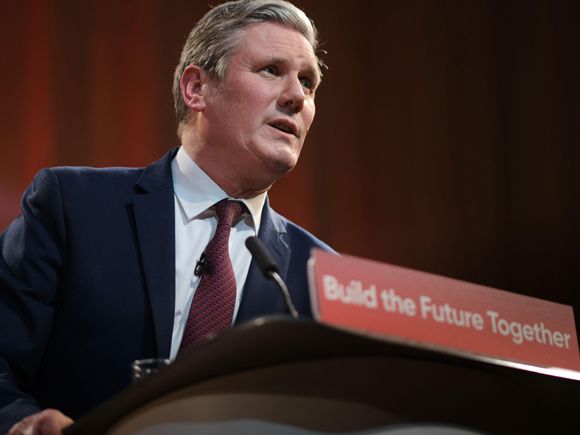Forget Boris Johnson. For the first time in a generation, the tide of democratic politics worldwide is running in a progressive direction. Over the last three years, left-leaning administrations have been elected in Spain, Finland, Denmark and the US. Progressive prime ministers in New Zealand and Portugal have succeeded in piling on votes when in power, moving from minority to majority government. In the last 12 months alone, left-of-centre leaders have won elections in Norway, Germany, Honduras, Chile, Australia and Colombia.This should add up to more than a hopeful environment for Keir Starmer—it should be a rich source of sorely needed ideas. Before Margaret Thatcher came to power, she would wave Hayek’s The Constitution of Liberty at her researchers, as a division of think tanks plotted how to put it into practice. In the 1990s, Tony Blair inherited John Smith’s Commission on -Social Justice, drew on Will Hutton’s vision of a German-style stakeholder economy and cherry-picked schemes from Bill Clinton’s administration in Washington. Ahead of 2010, David Cameron’s Big Society drew a little substance from overseas realities, such as Swedish “free” and American “charter” schools. By studying them, Michael Gove was able to drive through a hugely consequential overhaul of England’s school system within weeks of taking office.
Labour is a dozen years out of power and the world has changed beyond recognition since the Blair years. The party should be voraciously hungry for fresh policies dreamt up by ideological soulmates that have emerged intact from the fire of recent elections. Instead, it seems reticent about grabbing on to any positive plans, consumed instead by asserting what it is not—by smothering the last embers of Corbynism with Union Jacks. Amid a Tory crisis, sitting tight may be tempting. But the absence of excitement could be a campaign problem, even before a lack of solid plans translates into trouble governing.
So we have scoured the globe for a dozen progressive policies in action. We’ve deliberately looked away from those few fields (employment regulation, for example) where a clear Labour “offer” is firming up, and also those areas (elderly care, childcare) where resources, rather than ideas, are what’s really missing. Although the left is in the driving seat in all the countries examined, in some cases the policy highlighted has origins in a previous administration: progress doesn’t always arrive in the same colour.
These ideas won’t all gel together. Not all of them would necessarily fly in Britain. But they would all speak to at least part of the unwieldy constituency that Labour must court to govern again. And all are surely worth discussing—before an unforgiving country concludes that its aspiring leaders have nothing to say.
As the ousted PM’s party scrambles to “move on,” the opposition urgently needs to crystallise the unease
Denmark: Arne’s pension
The twin ogres behind most social challenges are ageing and inequality. Battling the first can create new problems with the second. In Britain, for example, jacking up the age for pension benefits has meant subjecting poorer 60-somethings to the punishing Jobseeker’s Allowance regime.
Denmark’s Social Democrats turned Arne Juhl, a bulky brewery worker of four decades’ standing, into an argument for change. Carting barrels around—or for that matter hoisting patients in and out of bed—takes a slow toll unmatched in desk jobs: Arne ended up with bad knees. The party resolved to cut physical grafters some slack from the wider rise in retirement ages. Nu er det Arnes tur—“It’s Arne’s turn now”—proved a winning slogan.
In practice, it’s hard to specify exactly what constitutes “toil.” Demanding that doctors certify industrial wear and tear would have denied the right to an earlier retirement to those still in good health. Instead, the reform focuses on “years in the labour market” (including spells out for childcare). It means people who have worked at least 42, 43 or 44 years by the age of 61 are able to get their money one, two or three years ahead, respectively, of the general retirement age of 67. Slogging from their teens, while other Danes were at college, the likes of Arne pass the test.
A special finance tax covers the policy. There has been vast interest, with 30,000 applications received before it went live in January. And putting fairness back at the heart of pensions could, potentially, make future increases in the main pension age, which are likely as people live longer, easier for citizens to accept.
Norway: A wealth tax
Once the Conservative leadership election has concluded, a desperate government seems bound to slash taxes. The calculation will be that, in a cash-strapped country and the run-up to an election, the opposition could feel powerless to resist. But tax cuts will intensify the grisly arithmetic bequeathed by the costs of Covid. Labour sorely needs a smart revenue-raiser in its back pocket, ready to force through in the first flush of victory.
In a society where fortunes are increasingly defined by what you own, rather than what you earn, the way to go is clear. Wealth has been swelling relative to income for decades: it must bear more of the burden.
The details are less important than that principle. With the biggest slice of British wealth tied up in property, we could go some way by—like Germany—rationalising the tax we already charge on it. Council tax is levied at lower rates on pricier properties, and remarkably is still calculated using valuations made amid the 1991 market crash. In the Federal Republic, it took the Constitutional Court to jolt politicians into updating an even older tax base, so maybe it’s more realistic to try something new.
Norway runs a general wealth tax, levied on all assets (minus debts) that an individual owns on New Year’s Eve, as valued on New Year’s Day. It begins to bite at 1.7m NOK (£140,000). It’s tried and tested, dating to 1892. But the Labour-led government has increased the total annual rates to 0.95 per cent for most liable individuals, and more for the rich, with a rate of 1.1 per cent for wealth in excess of a 20m NOK (£1.7m) threshold.
Australia: A new face for public probity
Something is rotten in the state of Britain. Even before Pinchergate, the Johnson years had witnessed Wallpapergate and Partygate. Not to mention the unlawful suspension of parliament, the Owen Paterson affair and two prime ministerial ethics advisers quitting. There are reports that Johnson’s staunch Fleet Street ally, Paul Dacre of the Mail group, will soon follow the PM’s own brother in being installed as a legislator for life in the Lords. The civil service is on its knees, and the country yearns for higher standards.
As the ousted leader’s party scrambles to “move on,” the opposition urgently needs to crystallise the unease. Over in Australia, Labor’s Anthony Albanese routed a three-term right-wing government that had presided over a sharp drop in the country’s standing on Transparency International’s anti-corruption index. The new PM resolved that a new ethos required a new face. He brought in Glyn Davis, a former vice chancellor of the University of Melbourne, to run the hub of his government machine and rebuild the Australian public service—all on the understanding that he would be free to offer frank and fearless advice.
The architecture of Whitehall is not quite the same: appointing someone to lead a sweeping review of public standards might be better than bringing them into the engine room. But the drive to clean things up will benefit enormously from having a prominent person in charge who enjoys Davis’s three key advantages: independent standing, outsider status and experience of having run something. Could Starmer persuade someone like former British Museum director Neil MacGregor or former Supreme Court president Brenda Hale to grasp the brief?
Having representatives of workers as well as bosses sign off on recruiting newcomers could support better integration of migrants
Germany: Chilling out on cannabis
Starmer’s instinct is to run a mile—but not because he believes that the last half-century of criminalisation has “worked.” The civil liberties lawyer is well aware that it has done nothing to stop marijuana moving from the bohemian fringe to the social mainstream, while at the same time disproportionately criminalising marginalised groups. But a fixation on a certain type of cartoon reactionary voter precludes admitting this out loud: instead, Labour runs attack ads painting the reformist Lib Dems as “soft on drugs.”
But are the dismal domestic politics here sustainable in the face of racing global change? Around a dozen EU states, including Spain and Portugal, have formally or effectively decriminalised, while 19 American states from Colorado to California have outright legalised. Sometimes it has been botched—California’s black market remains vast—but in Canada the government is now able to collect meaningful revenue, worth almost half the tax on tobacco, according to the author of one Deloitte analysis.
But what should really shift Starmer is plans for “regulated sale” in the German coalition agreement of the uber-cautious Olaf Scholz. The chancellor’s SPD was less keen than his Green and libertarian FDP partners, hence the reform comes with a four-year review clause to assess the public health risks. A pragmatic and measured step: how could any self-respecting “moderate” disagree?
Sweden: Bringing the unions into immigration
Brexit is unique: the impulses behind it are not. Immigration has become a neuralgic debate for progressives across Europe, one framed in once-liberal Sweden by the rise of the hard-right Sweden Democrats.
Some plans of Social Democratic Party migration minister Anders Ygeman, such as noisily ramping up deportations of foreign criminals, will strike British liberals as depressingly familiar. But there is one interesting twist buried in his proposal for the return of the “labour market test” for work permits, something the centre-right government under Fredrik Reinfeldt abolished after 2008.
All EU states have the option of testing whether economic conditions warrant importing non-EU labour, for example by informing job centres about a post or advertising it to test local interest. But in keeping with the state’s pre-EU traditions, Sweden used to make an assessment of national shortages jointly with the unions. Ygeman is starting an inquiry that could take the country back to this.
In Britain, the unions have never enjoyed this influence. Such a test could be especially important post-Brexit because the UK has discretion over EU as well as non-EU visas. Technocrats would be horrified at handing “producer interest” extra sway. But employers already choose which migrants to sponsor, and how seriously to attempt local recruitment first. Would factoring a union voice into the visa regime necessarily lock out any more energy and talent? Even if that is seen as a risk, having representatives of workers as well as bosses sign off on recruiting newcomers could support better integration in the end. And Starmer will be interested that polls currently put the Social Democrats well ahead in their September re-election bid.
Colombia: A ban on fossil fuels
Amid an energy crisis, this isn’t an easy moment to call time on North Sea oil and gas exploration. But whatever challenges that might pose for a Starmer government are as nothing compared with those confronting Gustavo Petro, who in August takes office as Colombia’s first leftist head of state, after a narrow election win alongside running mate Francia Márquez, an Afro-Colombian environmentalist.
Hydrocarbons have been one of the very few dependable earners for this war-weary country, in many places still gripped by the gangsterism highlighted by Emily Hart in July’s Prospect. Petrol and coal briquettes constitute half or more of its exports. No matter. Amid deepening climate chaos, Petro has plumped for the unthinkable over the unconscionable.
Last year, it was not Greenpeace but the International Energy Agency that identified the urgent necessity: “From today, no investment in new fossil fuel supply.” (Italics mine.) The new president isn’t quite bowing to that: the ban he proposes is not on developing existing fossil fuel facilities, but prospecting for new ones. Even so, walking his “managed and smooth” path would eventually mean leaving vast amounts of polluting treasure in the ground, and attempting to compensate by shifting investment and focus to renewables.
A run of European countries, including Denmark and Socialist-led Spain, have recently embraced bans on fossil fuel production, but the Colombian ambition is something else. As well as praying a poor country can pull this off against the odds, Starmer’s Britain should be humbled into action.
United States: Going big on infrastructure
The brief burst of optimism around Joe Biden’s first spell in power has gone. Assisted by just one reactionary Democrat, Senate Republicans have been able to thwart Biden’s main social reforms. But not before the old Capitol Hill hand had extricated from the haggling a $1.2 trillion infrastructure package, capable of passing with some Republican support.
The main elements include repaired roads, universal high-speed internet access and upgraded trains—all obvious productivity-boosting investments that could usefully be pursued in Britain. Is it affordable here? While the ultra-low interest rates we’ve grown used to are now creeping up, once allowance is made for inflation, long-term rates are still strongly negative. So the debt cost should shrink as the benefits for the economy (and the Exchequer) accrue.
Labour has made few clear infrastructure commitments, despite crying betrayal when the Tories reneged on the promised Yorkshire leg of HS2 and the east-to-west “Northern Powerhouse” high-speed railway. A serious vision on rail would be economically useful as well as popular in a region that now has many marginal seats. Action for comprehensive connectivity would transform rural communities dogged by glacial broadband and mobile blackspots and underpin a real “one-nation” pitch. Mending broken roads by rationalising and accelerating the current chaotic repair efforts, would win support from across the spectrum—and get Britain moving again.
New Zealand: A furlough for slumps
Recession is looming, and on one count working Britons stand uniquely exposed. Our basic unemployment benefit is the lowest in the OECD, typically replacing only a fifth of pay, compared with more than 60 per cent in most rich economies. Other benefits sometimes soften the blow, but redundancy is frequently a trapdoor to immediate poverty.
That position is hard to square with the UK’s furlough scheme, a great improvised success in protecting the incomes and jobs of workers that would otherwise have been destroyed by Covid. If blameless employees deserve protection from a rampaging virus, then don’t they also warrant shelter when caught by a raging economic storm?
Like Britain, New Zealand has traditionally relied more on a welfare safety net than wage-replacement benefits. But Jacinda Ardern’s government has developed an “income insurance” scheme, jointly with unions and business groups. Both sides of industry will chip in an estimated 1.39 per cent of wages in return for cover against being laid off, which is worth—subject to a cap for high earners—80 per cent of previous pay for six months.
The extra tax will be a hard sell, but could be a shrewd investment. The argument is less about charity than productivity: buying workers the time they need to find a new role that harnesses their skills and experience, instead of harrying them into the first dead-end job. With extended payments available for those re-training, a standing furlough scheme might just provide a way to jolt our stagnating economy into working smarter.
New car sales are over 90 per cent electric in Norway, allowing the government to focus on subsidies for mass-market rather than luxury vehicles
New Zealand: No-fault accident insurance
That “income insurance” initiative will be administered by a longer-standing New Zealand institution, the Accident Compensation Corporation (ACC). As Starmer struggles to shrug off the “London lawyer” caricature, something like this could help him confront the culture of “safetyism” that protects bureaucracies over their clients, and attract free-spirited voters.
Under the ACC system, other than when exemplary damages are warranted, the right to sue over accidents is waived in return for “no-fault” compensation. Premiums are paid in earmarked levies, for example on fuel (for motor accidents), on employers (for workplace injuries) and on employees (for accidents away from work). But they are not pure cost: much compensation would otherwise come from separate public funds.
The theoretical risk is that this dulls the fear of litigation, and so makes employers, clinicians and drivers cavalier about accidents. But this is trumped by practical consideration of “what works.” ACC decisions are made quickly (within a day for simple cases), first payments typically follow within a week, and public trust in the outcomes is high, at 67 per cent. All this compares favourably with claiming private insurance, let alone protracted court action, where legal fees can eat deeply into compensation. Moreover, freed of the blame game, bureaucrats and medics may be less inhibited in establishing and learning
from mistakes.
Targeted on the right problems, a British ACC could conceivably save money. The NHS clinical negligence bill is over £2bn, with admin on top. Get the money out of the door quicker, with less process and less argument, and the only losers would be the lawyers—as Starmer should lose no chance to point out.
Norway: Supercharge electric cars
Rapidly electrifying cars is non-negotiable for net zero: transport is the biggest source of UK emissions, and roads do 91 per cent of the damage. Johnson vowed to end petrol car sales in 2030 (and hybrids in 2035), but there is a chasm between promise and delivery—which Norway shows how to close.
Despite recent growth, plug-in cars (which includes some hybrids) are projected to account for only a quarter of 2022 UK new car sales. Pure electric models will constitute just a sixth. Amid tales of nightmare journeys, the government concedes that the “slow” rollout of charging points is “not at a pace consistent with what is needed to deliver a wholly zero emission new car fleet by 2035.” As for the “old car fleet,” replacement feels hopelessly remote.
But it needn’t take forever, if—to borrow from Eric Lonergan and Corinne Sawers’s Super-Charge Me—you “super-charge” the transition. Plug-in vehicles still stubbornly cost more than conventional cars in Britain—even before ministers axed their £1,500 grant in June. But in Norway, tax tweaks had already made an electric VW Golf cheaper than a petrol model by 2020. With the higher upfront cost in Britain, the typical £600 annual saving in running costs is simply not enough. Oslo, by contrast, pulled every lever, halving parking charges and road tolls for plug-in vehicles.
The upshot? New sales are over 90 per cent electric, allowing the new Labour-led government to safely trim subsidies and focus them on mass-market, rather than luxury, vehicles. Attention can now turn to other accelerated transitions. Getting cars right is just the start of the journey.
Finland: Banning school fees
British prime ministers waffle about social mobility: Finland’s Sanna Marin embodies it. Her path to the premiership at 34 began in a family shaped by divorce, deprivation and her father’s alcoholism. She had a job in a bakery at 15, but still became the first in her family to get to university—and from there, to the top.
This inspirational tale might seem freakish to Brits, when a third of our leaders started out at the same pricey school as Boris Johnson. But then Finland is always near the top of the table in social mobility data, and poor Finnish children can expect to climb the income ladder faster than their counterparts in Britain and elsewhere.
So what are they doing right? By its nature social mobility unfolds slowly: the relevant decisions were taken long ago. Back in the 1960s, private educational institutions loomed large, but were then brought within a reformed state system. Charging fees for the basic education that leads to qualifications was banned. An outright bar on independent schools could clash with civil liberties, but note that in Finland private establishments are not banned: a small number exist. The funding, however, is public. There is also a profit ban, something Sweden’s Social Democrats are now interested in mimicking, thus clamping down on the free schools that inspired England’s Gove revolution. Why? Because it transpires that in the “bog-standard” schools of Finland, standards are not only more equal across schools, but also among the very highest in Europe.
Scotland: Community landownership
It pains Labour to admit it, but there is one social-democratic party in the UK that’s still on a winning streak after 15 years in power. Whatever the objections to the SNP’s separatism and decidedly mixed social policy record, it’s worth asking: what are the progressive ideas that have sustained this extraordinary run?
Land reform is one, which is relatively easy for Labour to swallow as the first steps came when it was still in charge. A “community right-to-buy” was created in 2003, giving interested rural populations of up to 10,000 a right of first refusal on local lands coming up for sale, plus stronger rights for compulsory purchase, specifically for crofters. The SNP has radically extended things. In 2015, it removed the population cap, opening the possibility of reform in the cities, and empowered communities to snap up neglected property even if it didn’t have a willing seller. A 2016 law gave community trusts the right to force a sale on land needed for “sustainable development.” Grants lubricate the system.
Guy Shrubsole, author of Who Owns England?, says such reforms could make a “huge difference” in England. Here, there is only a hollow Cameron-era community “right-to-bid,” with no protection against being gazumped. Combined with planning reform that privileges community-owned land, a proper right-to-buy could also unlock the discussion on housebuilding, by ensuring the gains were widely shared. And it would empower villagers exposed to flooding by the grouse-shooting moors on the hillsides above them to force landowners to the table—a progressive way of “taking back control.”


























